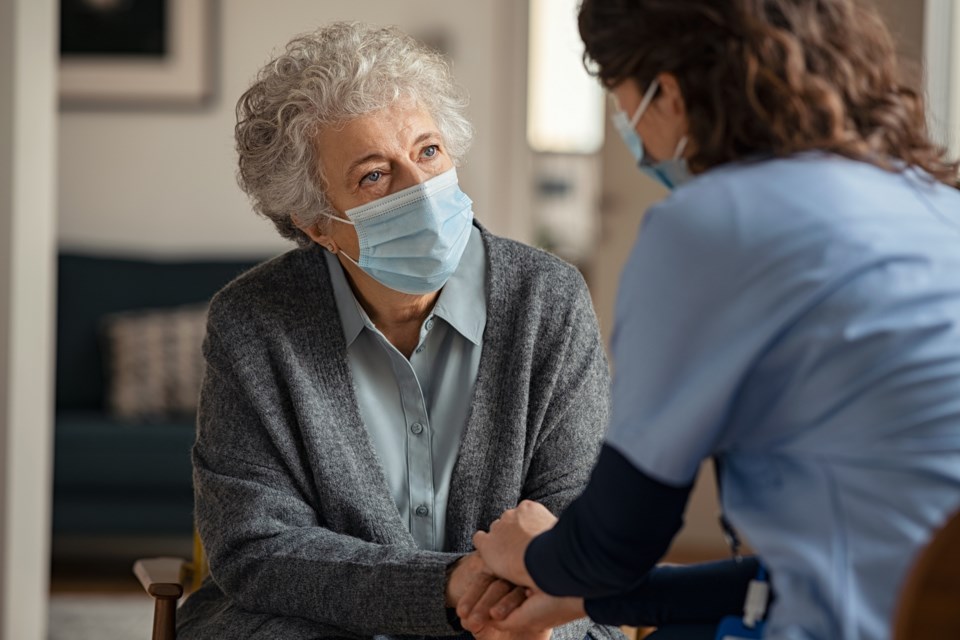As of 12:01 a.m. on Thursday, Dec. 30, the Ontario government will implement temporary changes to the health guidance for long-term care (LTC) homes that includes:
• Access to long-term care homes by general visitors will be paused. Designated caregivers may continue to enter long-term care homes.
• Day absences for all residents for social purposes will be paused.
Policies to protect those in LTC were introduced earlier this month that require all general visitors to be fully vaccinated against COVID-19. Any staff caring for a suspected or confirmed case of COVID-19 is also required to wear a fit-tested, seal-checked N95 respirator.
“We know these measures are difficult for residents and families, but we must stand strong to protect our most vulnerable, which includes residents of long-term care homes," said Ontario's Chief Medial Officer of Health, Dr. Kieran Moore, in a news release issued today.
Full text of the release follows:
In response to the evolving Omicron situation, the Ontario government, in consultation with the Chief Medical Officer of Health, is taking further actions to protect the health and safety of residents, staff and caregivers in long-term care homes.
The following temporary measures at long-term care homes will go into effect at 12:01 a.m. on Thursday, Dec. 30, 2021:
• Access to long-term care homes by general visitors will be paused. Designated caregivers may continue to enter long-term care homes.
• Day absences for all residents for social purposes will be paused.
“We know that long-term care residents face an increased risk of COVID-19. Given the high community infection rates we’re seeing with the Omicron variant, the time for more action is now,” said Rod Phillips, Minister of Long-Term Care. “In addition to the steps we’ve already taken, these new temporary measures will help keep residents safe and help critical staff remain on the job.”
The government will closely monitor the situation in long-term care homes and continue to adjust measures as necessary to keep residents and staff safe.
Earlier this month, the government put in place policies in long-term care homes designed to optimize safety for residents and staff, including the requirement that all general visitors need to be fully vaccinated to enter a home. The province is also requiring all staff caring for a resident with a confirmed or suspected case of COVID-19 to wear a fit-tested, seal-checked N95 respirator. However, the high transmissibility of the Omicron variant will likely mean staff being exposed to or contracting COVID-19 in the community and more outbreaks in long-term care homes. This means that it is imperative to keep COVID-19 out of homes wherever possible and prevent spread within homes, with the most important objective being the prevention of severe outcomes for residents and staff.
“I understand that these new, temporary measures will impact residents’ ability to have close contact with many of their friends and family members,” said Minister Phillips. “We must remain vigilant against the Omicron variant to protect long-term care residents and staff.”
“We know these measures are difficult for residents and families, but we must stand strong to protect our most vulnerable, which includes residents of long-term care homes,” said Dr. Kieran Moore, Chief Medical Officer of Health. “I encourage everyone to get their booster shot as soon as possible so we can keep everyone safe with the added layer of protection that the vaccine provides.”
The COVID-19 vaccine remains the single best protection against COVID-19 and variants. Every eligible Ontarian is strongly recommended to get vaccinated or receive their booster as soon as possible.
Quick facts
• While COVID-19 immunizations have been demonstrated to be very effective, it is important for Ontarians to not let their guard down in the ongoing fight against the pandemic, in particular with the Delta and Omicron variants. It is essential that all staff, caregivers and residents in long-term care homes continue to practice basic public health measures including screening at entry, masking, physical distancing, hand hygiene and staying at home when sick.
• As of Nov. 30, 2021, data shows that 99 per cent of long-term care staff, students and volunteers are fully vaccinated. In addition, as of Dec. 22, 2021, 84 per cent of eligible residents and 43 per cent of eligible staff have received their third dose.
